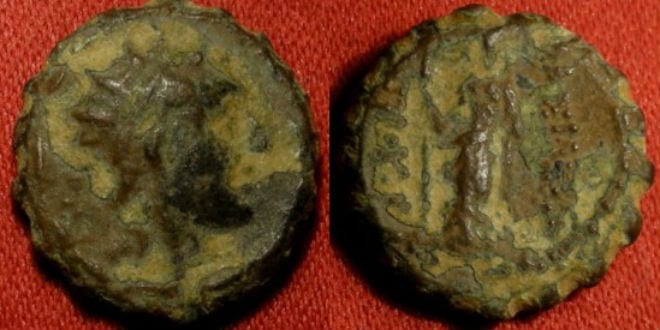Nearly 30 years after archaeologists finished their excavations, representatives from Jerusalem’s Tower of David announced on Tuesday the unexpected discovery of a 2,000-year old bronze coin.
Orna Cohen, chief conservation officer at the Jerusalem’s Tower of David, was inspecting some minor damage in the tower’s courtyard when she was surprised to see the glint of metal amongst the tumbled rocks. What she had discovered was a pruta, a bronze penny from the Hasmonean Era, when the Jewish Maccabees defeated the Greeks in a battle that is now commemorated during the holiday of Hanukkah.
The face of Antiochus IV Epiphanes appears on the front of the bronze penny, and the reverse side portrays the Greek goddess Hera holding a torch and scepter in her hand.

Antiochus IV was a Hellenistic Greek king of the Seleucid Empire from who ruled from 175 BCE until his death in 164 BCE. He was noted for his extreme persecution of the Jews.
Early in his rule, Antiochus IV crushed a failed Jewish uprising by slaughtering 40,000 people and enslaving 40,000 more. He continued his oppression of the Jews by allying with Hellenized secular Jews and outlawing Jewish religious practice, instituting pagan worship in its place. Antiochus IV made possession of Torah scrolls a capital offense, burning any copies he could find, and in 168 BCE, he destroyed Jerusalem.
Though the coin is not dated, it is fairly identical to thousands of others known to be in existence. The coins are believed to have been minted in the Israeli coastal city of Akko (Acre) sometime between 172 and 168 BCE, during the reign of Antiochus IV. The Tower of David has sent the coin to the Israel Antiquities Authority for authentication.
The timing of the recent find couldn’t be more appropriate. On Saturday night, Jews around the world will light the first candle of the eight-day holiday of Hanukkah, also known as the Festival of Lights, commemorating the Maccabees’ victory over Antiochus IV and the rededication of the Temple.
Archaeological finds like this are particularly important today, when UNESCO and other bodies outright deny Jewish claims to a historic and religious connection to Jerusalem and other holy sites in Israel.



